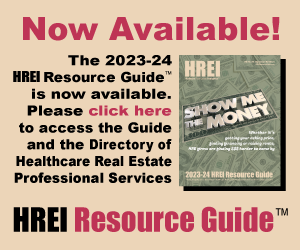With ObamaCare facing an uncertain fate, will we see a return to “analysis paralysis?”
 If you attended the annual BOMA Medical Office Buildings (MOBs) conference in Orlando in May, you might recall that the luncheon keynote speaker on Day 2 was Charlie Cook, publisher of The Cook Political Report. During his very interesting and entertaining talk, Mr. Cook, a well-respected political pundit, said that the Republicans had nominated the only candidate who was likely to lose to Hillary Clinton. He noted that the GOP could have nominated “a potted plant” and won the election.
If you attended the annual BOMA Medical Office Buildings (MOBs) conference in Orlando in May, you might recall that the luncheon keynote speaker on Day 2 was Charlie Cook, publisher of The Cook Political Report. During his very interesting and entertaining talk, Mr. Cook, a well-respected political pundit, said that the Republicans had nominated the only candidate who was likely to lose to Hillary Clinton. He noted that the GOP could have nominated “a potted plant” and won the election.Well, things obviously didn’t turn out as Mr. Cook or almost any other pundit expected. This morning’s posting on The Cook Political Report website, is titled “The Shock Heard ‘Round the World,” and Mr. Cook writes, “I got it wrong. Really wrong. Trump didn’t just win, he crushed it. This is truly the most shocking thing that I have seen in my lifetime.”
What does all this mean for the healthcare industry and healthcare real estate (HRE)? As Mr. Cook notes in this morning’s article, we’re obviously going to be sorting out the implications of the Trump win for a long time to come. But I was reminded of what he said over lunch at BOMA — that no matter who is president, it really doesn’t have that much direct impact on the economy or, presumably, on the HRE business.
That’s probably a reasonable assertion. But when Mr. Trump takes office there is going to be a potentially more immediate impact on the healthcare industry and HRE than there will be on most industries because, as we all know, Mr. Trump has vowed to repeal the Patient Protection and Affordable Care Act (PPACA), which he calls “a disaster.” Some doubt that will happen in its entirety. But there’s still plenty he can do smaller legislative changes and executive orders to weaken the law. Some of those steps include promoting tax-free healthcare savings accounts, making insurance premiums tax-deductible, allowing insurers to sell policies across state lines, turning Medicaid into a state block grant program and allow consumers to import drugs from other developed countries.
Again, none of those moves would appear likely to have an immediate, direct impact on real estate or facilities. But with this new uncertainty, one must wonder if we might be in for a period of “analysis paralysis” like we were after the PPACA was first passed in 2010, when providers put most real estate and facilities decisions on hold until they could better understand the implications of ObamaCare. Look for more on this story in upcoming editions of Healthcare Real Estate Insights as we, like you, try to figure this out.
The full content of this article is only available to paid subscribers. If you are an active subscriber, please log in. To subscribe, please click here: SUBSCRIBE






